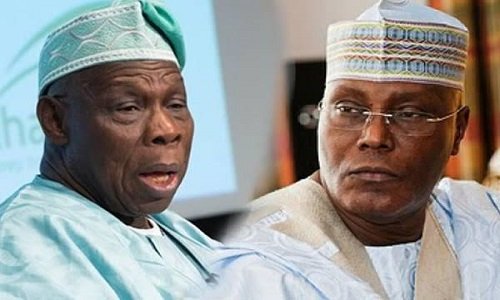The Federal High Court in Lagos on Tuesday heard that Abdullahi Babalele, a son-in-law of former Vice-President Atiku Abubakar, allegedly gave former President Olusegun Obasanjo the naira equivalent of $140,000.
An Economic and Financial Crimes Commission (EFCC) witness, Bashir Mohammed, told Justice Chukwujekwu Aneke that he delivered the cash to Obasanjo on behalf of his “close friend” Babalele.
Babalele is on trial for allegedly laundering $140,000 in the build-up to the 2019 general elections.
The EFCC arraigned him on two counts of money laundering in August.
He procured Mohammed “to make a cash payment of $140,000 without going through any financial institution,” the anti-graft agency claimed.
EFCC prosecutor, Rotimi Oyedepo, said the money exceeded the threshold stipulated by the money laundering Act.
The alleged February 20, 2019 transaction contravened Sections 18 (c) and (2)(b)of the Money Laundering (Prohibition) Act, 2011, Oyedepo said.
Babalele pleaded not guilty.
On Tuesday, the EFCC called Mohammed as its first witness.
Led in evidence by the EFCC counsel, Rotimi Oyedepo, the witness narrated how he allegedly delivered the sum to the former president at his Abeokuta, Ogun State home.
Obasanjo endorsed Atiku, who was the presidential candidate of the Peoples Democratic Party (PDP), ahead of this year’s presidential poll.
But Atiku lost the election to incumbent President Muhammadu Buhari of the All Progressives Congress (APC).
Mohammed said he got a phone call from Babalele sometime in February, requesting him to deliver a message to “an elder statesman.”
He said on Babalele’s request he supplied two bank accounts, which were credited.
Read Also: Magu Tasks Corps Members On Leadership
The court heard that the witness took the money to Obasanjo’s residence in Abeokuta, Ogun State.
Mohammed said: “When I got to the gate, somebody came and took me inside where I met former President Olusegun Obasanjo and delivered the message.”
“I called the defendant in the presence of former President Obasanjo and informed him that I had delivered the message. He said that was good and thanked me.”
Under cross-examination by the defence counsel, Mike Ozekhome (SAN), Mohammed affirmed that he wrote a statement at the EFCC office during the investigation.
Ozekhome’s bid to tender the statement as an exhibit was, however, opposed by the prosecutor.
Justice Aneke adjourned till today to rule on the admissibility of the statement.
NAN

